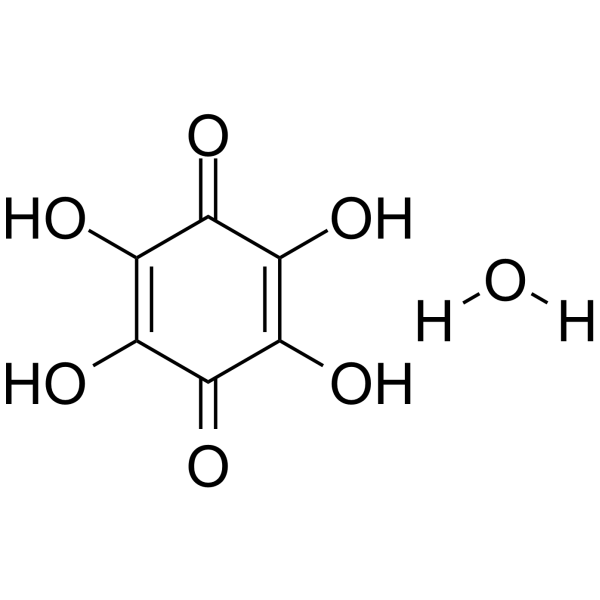上海金畔生物科技有限公司为生命科学和医药研发人员提供生物活性分子抑制剂、激动剂、特异性抑制剂、化合物库、重组蛋白,专注于信号通路和疾病研究领域。
Tetrahydroxyquinone monohydrate (Synonyms: Tetrahydroxy-1,4-benzoquinone monohydrate; Tetrahydroxybenzoquinone monohydrate) 纯度: ≥97.0%
Tetrahydroxyquinone monohydrate (Tetrahydroxy-1,4-benzoquinone monohydrate),一种抗白内障剂,是一种具有氧化还原活性的苯醌。Tetrahydroxyquinone monohydrate 可与半醌自由基一起参与氧化还原循环,导致活性氧 (ROS) 形成。

Tetrahydroxyquinone monohydrate Chemical Structure
CAS No. : 1215458-51-7
| 规格 | 价格 | 是否有货 | 数量 |
|---|---|---|---|
| 10 mM * 1 mL in DMSO | ¥550 | In-stock | |
| 100 mg | ¥500 | In-stock | |
| 200 mg | 询价 | ||
| 500 mg | 询价 |
* Please select Quantity before adding items.
Tetrahydroxyquinone monohydrate 相关产品
•相关化合物库:
- Bioactive Compound Library Plus
- Apoptosis Compound Library
- Immunology/Inflammation Compound Library
- Metabolism/Protease Compound Library
- NF-κB Signaling Compound Library
- Stem Cell Signaling Compound Library
- Anti-Cancer Compound Library
- Anti-Aging Compound Library
- Antioxidants Compound Library
- Oxygen Sensing Compound Library
- Ferroptosis Compound Library
- Pyroptosis Compound Library
- Mitochondria-Targeted Compound Library
| 生物活性 |
Tetrahydroxyquinone monohydrate (Tetrahydroxy-1,4-benzoquinone monohydrate), a primitive anticataract agent, is a redox active benzoquinone. Tetrahydroxyquinone monohydrate can take part in a redox cycle with semiquinone radicals, leading to the formation of reactive oxygen species (ROS)[1]. |
||||||||||||||||
|---|---|---|---|---|---|---|---|---|---|---|---|---|---|---|---|---|---|
| 体外研究 (In Vitro) |
Tetrahydroxyquinone (100-500 μM; 24 hours; HL60 cells) treatment shows cytotoxic for HL60 leukaemia cells by total protein content (IC50 of 20 µM), phosphatase activity (IC50 of 40 µM), or by MTT assay (IC50 of 45 µM). Tetrahydroxyquinone is an efficient inducer of ROS production in HL60 leukaemia cells[1]. Shanghai Jinpan Biotech Co Ltd has not independently confirmed the accuracy of these methods. They are for reference only. |
||||||||||||||||
| 分子量 |
190.11 |
||||||||||||||||
| Formula |
C6H6O7 |
||||||||||||||||
| CAS 号 |
1215458-51-7 |
||||||||||||||||
| 中文名称 |
四羟基苯醌水合物;四羟基-1,4-苯醌水合物 |
||||||||||||||||
| 运输条件 |
Room temperature in continental US; may vary elsewhere. |
||||||||||||||||
| 储存方式 |
|
||||||||||||||||
| 溶解性数据 |
In Vitro:
DMSO : 100 mg/mL (526.01 mM; Need ultrasonic) 配制储备液
*
请根据产品在不同溶剂中的溶解度选择合适的溶剂配制储备液;一旦配成溶液,请分装保存,避免反复冻融造成的产品失效。 In Vivo:
请根据您的实验动物和给药方式选择适当的溶解方案。以下溶解方案都请先按照 In Vitro 方式配制澄清的储备液,再依次添加助溶剂: ——为保证实验结果的可靠性,澄清的储备液可以根据储存条件,适当保存;体内实验的工作液,建议您现用现配,当天使用; 以下溶剂前显示的百
|
||||||||||||||||
| 参考文献 |
|
所有产品仅用作科学研究或药证申报,我们不为任何个人用途提供产品和服务
